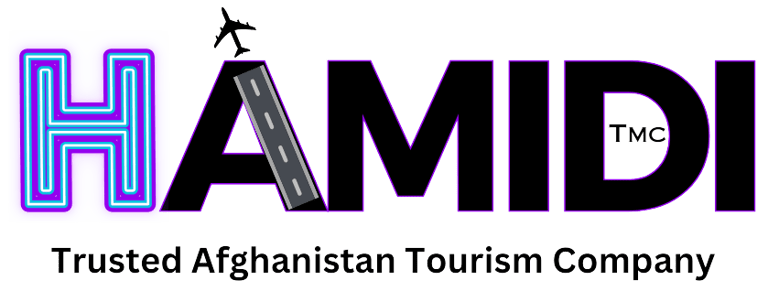Special B2B rates available for businesses, travel agents, and group organizers booking travel to Afghanistan with us.
Travel Regulations & Guidelines for Afghanistan
– HAMIDI TMC
Introduction
Travelers to Afghanistan must comply with local laws and regulations to ensure a safe, respectful, and lawful visit. Afghan authorities strictly regulate the import, export, and use of certain items, especially those related to culture, security, and religion. Violations may result in serious legal consequences.
Prohibited Items
Cultural Artifacts
Exporting archaeological, historical, or ethnological items is strictly prohibited. Import restrictions on certain cultural items remain in effect until Further Notice.
Narcotics & Illegal Drugs
Possession, use, or trafficking of illegal drugs is strictly forbidden and carries severe penalties.
Weapons & Ammunition
Weapons, ammunition, explosives, and body armour are prohibited without explicit official authorization.
Pornographic Material
The possession or distribution of pornographic content is illegal.
Subversive Materials
Any material considered anti-government or contrary to Islamic principles is prohibited.
Religious Insignia
Items displaying religious symbols or inscriptions may be restricted.
General Travel Guidelines
Political Materials
Avoid bringing political books, flags, or symbols.
Drones
Importing or using drones without authorization is illegal and may lead to fines or detention.
Printed Materials
Books, magazines, and publications are subject to review by the Ministry of Information and Culture.
Medications
Carry only personal-use quantities and keep a doctor’s prescription with you.
Currency
Declare cash amounts exceeding the permitted limit upon arrival.
Photography
Photography of government buildings, military sites, and sensitive locations is prohibited.
Behaviour
Public behaviour must respect local customs. Public displays of affection are not acceptable.
Additional Travel Tips
Alcohol
Alcohol is strictly prohibited. Do not carry or consume alcohol.
Dress Code
Dress modestly at all times. Women are encouraged to wear a headscarf; revealing clothing should be avoided by all travellers.
Travel Insurance
Strongly recommended, including medical coverage and emergency evacuation.
Public Protests & Demonstrations
Avoid all protests or political gatherings.
Religious Sensitivity
Respect Islamic practices, especially during Ramadan. Eating, drinking, or smoking in public during daylight hours may be considered disrespectful.
Political Discussions
Avoid discussing government or political topics with locals.
Government & Military Sites
Entry is prohibited without official permission.
Traveller Responsibility
Travelers must clearly state the purpose of their visit and ensure it matches the visa type issued. A tourist visa must not be used for journalism, work, or other purposes.
HAMIDI Tour & Travel Management Company (HAMIDI TMC) provides travel services only and does not assume responsibility for individual actions, personal safety, or legal compliance. Travelers are fully responsible for understanding and following Afghan laws and regulations.
Rules for Journalists, YouTubers & Media Professionals
Accreditation Required
Official media accreditation from Afghan authorities is mandatory before any media activity.
Filming & Recording
Permission is required for filming or recording, especially in public, government, or sensitive areas.
Sensitive Content
Avoid political, religious, or anti-government content. Violations may lead to detention, deportation, or confiscation of equipment.
Cultural Respect
Media coverage must respect local customs and traditions.
Protests & Civil Unrest
Reporting on protests or demonstrations is highly restricted without explicit authorization.
Drone Usage
Drone use for media purposes requires prior approval.
Responsible Reporting
Media professionals must provide factual, balanced reporting and avoid sensationalism or misleading narratives.
Contact Information
WhatsApp: +93 749 29 29 22
Phone (Afghanistan Office):
+93 749 29 29 22
Email: info@hamiditmc.com
Website: www.hamiditmc.com
Important Reminder
Regulations may change. Always consult official Afghan government sources or the Afghan embassy/consulate in your country before travel.
All visitors and media professionals must follow these rules to ensure a safe, respectful, and lawful stay in Afghanistan.
Get all the essential Afghanistan Travel Info you need with HAMIDI TMC. We provide clear guidance to ensure your journey is safe, smooth, and enjoyable.
Visa & Permits:
Step-by-step support for tourist and business visas
Assistance with travel permits for different regions
Guidance on required documents and application process
Safety Tips:
Reliable local guides for all destinations
Secure travel routes and accommodations
Practical advice on staying safe while exploring
Local Culture & Customs:
Learn about Afghan traditions and etiquette
Tips for interacting respectfully with locals
Insights into cultural festivals and events
Transportation & Accommodation:
Comfortable vehicles for tours and transfers
Trusted hotels and guesthouses across Afghanistan
Options for private and group travel experiences
At HAMIDI TMC, we make your trip stress-free by handling logistics and providing expert advice. From visas to local tips, our goal is to give you confidence and convenience on your journey.
Plan your trip with HAMIDI TMC and explore Afghanistan fully prepared, safe, and informed.
Call & WhatsApp or Email us : +93-749 29 29 22
All rights reserved © 2026 HAMIDI TMC. Designed and developed by Hamidix.com. HAMIDI TMC is officially registered in Afghanistan under registration number ATO 00377.
info@hamiditmc.com
